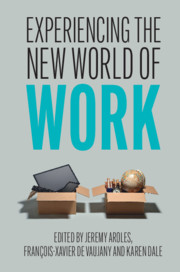2 results
4 - Experiencing Making
- from Part I - Experiencing at Work
-
-
- Book:
- Experiencing the New World of Work
- Published online:
- 24 December 2020
- Print publication:
- 21 January 2021, pp 84-106
-
- Chapter
- Export citation

Experiencing the New World of Work
-
- Published online:
- 24 December 2020
- Print publication:
- 21 January 2021

